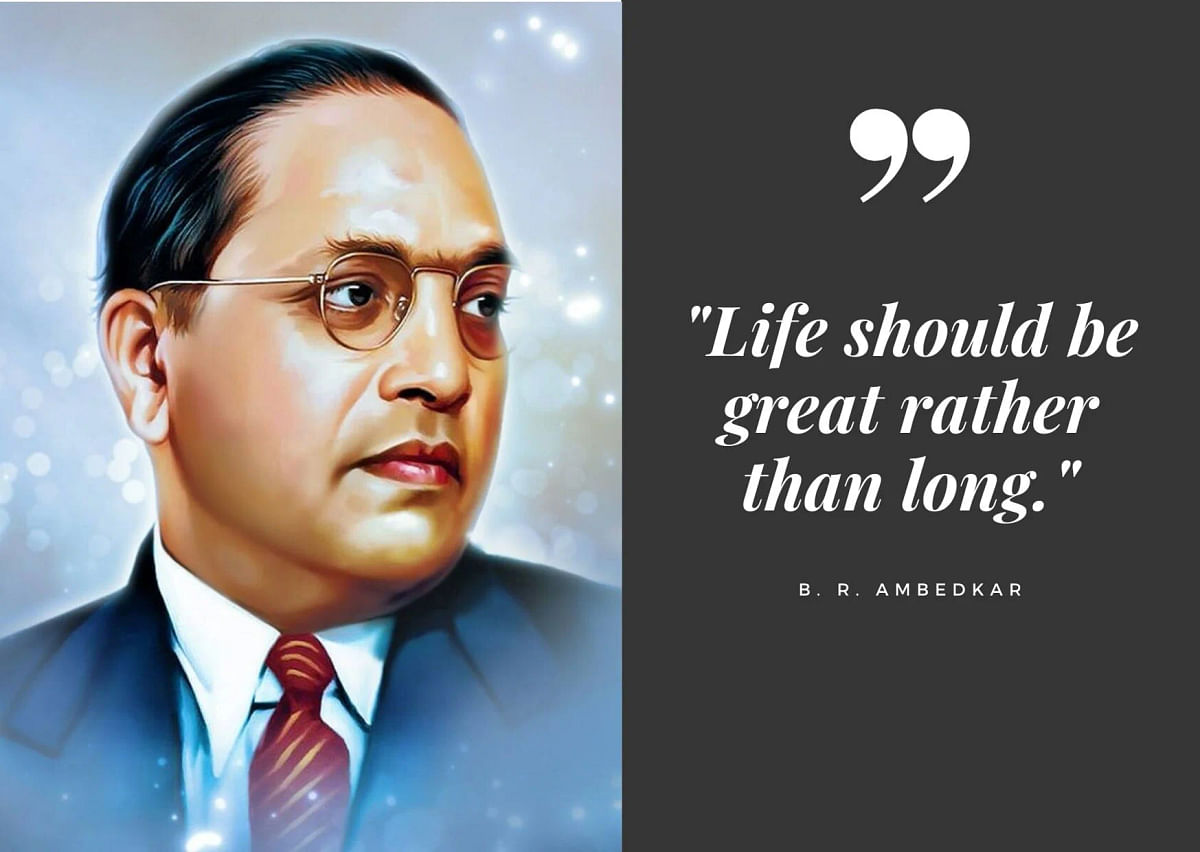


As we celebrate Ambedkar Jayanti on April 14, we honor the legacy of Dr. Babasaheb Ambedkar, who was instrumental in shaping India's Constitution. On this special day, let us reflect on 10 of his most inspiring quotes, including his emphasis on the progress of women, the importance of a religion that promotes equality, and the ultimate aim of cultivating our minds. Let us also remember his belief in serving society and the significance of freedom of mind in achieving real freedom. Finally, let us take pride in India's Constitution, which enshrines the principles of democracy, socialism, and secularism, and acknowledge the role of law and order in maintaining a healthy society.
Dr. B.R. Ambedkar: A Visionary Leader and Architect of the Indian Constitution
Dr. Babasaheb Bhimrao Ambedkar, popularly known as B.R. Ambedkar, was an Indian jurist, economist, and social reformer who played a pivotal role in shaping India's modern constitution. Born into an untouchable Dalit caste in Maharashtra on April 14, 1891, Ambedkar faced immense discrimination and prejudice throughout his life.
Early Life and Education
Despite facing societal ostracism, Ambedkar excelled in his studies. He earned degrees from Elphinstone College in Bombay, Columbia University, and the London School of Economics. His doctoral dissertation, "The Problem of the Rupee: Its Origin and Its Solution," gained him international recognition.
Anti-Caste Movement
Ambedkar dedicated his life to fighting against the oppressive caste system that plagued Indian society. He founded the Bahishkrit Hitakarini Sabha (Depressed Classes Welfare Association) in 1924 to advocate for the rights of untouchables. In 1932, he led the Mahad Satyagraha, a movement to break the ban on untouchables from entering public water sources.
Constitutional Assembly
In 1947, Ambedkar was appointed as the Chairman of the Drafting Committee of the Indian Constituent Assembly, responsible for drafting India's constitution. He played a crucial role in shaping the constitution's principles of equality, liberty, and social justice.
Legacy
Dr. Ambedkar's contributions to Indian society are countless. He was an ardent proponent of women's rights, education, and the upliftment of the oppressed. His teachings continue to inspire generations of Indians and serve as a guide for social reform and inclusivity.
Top 5 FAQs on Dr. B.R. Ambedkar and the Indian Constitution
Q1: When is Ambedkar Jayanti celebrated? A: Ambedkar Jayanti is celebrated on April 14 every year, the birth anniversary of Dr. B.R. Ambedkar.
Q2: What was the main aim of the Indian Constituent Assembly? A: The aim of the Indian Constituent Assembly was to draft a constitution that would govern the newly independent India.
Q3: What are the key principles of the Indian Constitution? A: The key principles of the Indian Constitution include democracy, socialism, secularism, equality, liberty, and justice.
Q4: What was Dr. Ambedkar's role in the Indian Constitution? A: Dr. Ambedkar was the Chairman of the Drafting Committee of the Indian Constituent Assembly and played a pivotal role in drafting the constitution.
Q5: What is Dr. Ambedkar's significance in Indian society today? A: Dr. Ambedkar's teachings continue to inspire generations of Indians and serve as a guide for social reform and inclusivity. He remains a symbol of hope and inspiration for the oppressed and disenfranchised.

The Election Commission of India is facing backlash after a large number of VVPAT slips were found dumped near a college in Bihar. The Commission has ordered an inquiry and the concerned ARO has been suspended. Political parties such as the RJD have accused the Commission of being a "thief commission" and "dacoit of democracy" and have demanded a thorough investigation. The district administration is currently conducting an investigation and an FIR will be filed in the case.

The BJP has criticized J&K CM Omar Abdullah for his opposition to the recitation of Vande Mataram in schools, accusing him of appeasement politics. According to party spokesperson Shehzad Poonawalla, this opposition is motivated by vote-bank considerations and follows a pattern of similar objections by leaders across states. Poonawalla also alleged that these leaders have a history of opposing national symbols and prioritizing their politics of appeasement over the Constitution.

Prime Minister Narendra Modi met veteran BJP leader and Bharat Ratna awardee Lal Krishna Advani at his residence on Saturday, on the occasion of his 98th birthday. PM Modi took to social media to extend birthday greetings and praise Advani's monumental service to the nation, calling him a statesman with a towering vision. Home Minister Amit Shah and former Vice President M. Venkaiah Naidu also sent their wishes, highlighting Advani's contributions to strengthening the BJP and the country's progress.

Prime Minister Narendra Modi inaugurated a two-day conference on strengthening the legal aid system in India. He highlighted the crucial role of ensuring ease of justice in achieving the goals of ease of doing business and ease of living. The conference will discuss key aspects of the legal services framework, including the role of technology and mediation in improving justice delivery. PM Modi also launched a training module for community mediation to empower individuals in resolving disputes at the grassroots level.

Anumula Revanth Reddy, the Congress legislature party leader, will be taking oath as the second Chief Minister of Telangana amidst great anticipation as senior officials and one lakh people are expected to attend the event. Prominent leaders like Sonia Gandhi, Rahul Gandhi, and Priyanka Gandhi Vadra will also be present at the ceremony. Reddy has extended an open invitation to the public, emphasizing the 'people's government' he aims to establish.

A political controversy has emerged during the Bihar assembly elections after VVPAT slips were found dumped near a college in Samastipur. The Chief Election Commissioner has clarified that the slips were used in mock polls and did not affect the actual voting process. However, the RJD and Congress have raised questions about the conduct of the election and an on-the-spot investigation has been ordered.

In a shocking incident, a large number of VVPAT slips were found scattered on the roadside in Bihar's Samastipur district. The Election Commission swiftly took action and suspended an assistant returning officer for negligence, along with filing a FIR against him. The DM has been asked to inquire into the matter and an investigation has been launched. Though the integrity of the polling process remains uncompromised, the incident has raised serious concerns about the security and transparency of elections in India.

A clash broke out between West Bengal Police and Border Security Force (BSF) over the seizure of a smuggled consignment of banned syrup, phensedyl, in Nadia district. Three police personnel were injured and one BSF jawan was detained in the incident. However, senior officers from both sides were able to resolve the misunderstanding and the detained BSF jawan was released. BSF and police assure cooperation in serving national interests.

Leaders of the opposition Congress party in the Indian state of Goa have launched a scathing critique of the ruling Bharatiya Janata Party (BJP), slamming them for their failure to ensure law and order in the wake of multiple murders, including that of activist Umakant Khote. The Congress leaders called for an emergency assembly session to address what they termed a "complete breakdown of policing and governance," citing a string of violent incidents as evidence of a systemic failure. According to the opposition, Goa's reputation as a peaceful tourist destination has been tarnished by a rise in crime and corruption, worsened by economic struggles that have left locals vulnerable to land grabs by private developers.

The Goa government, under CM Pramod Sawant, has granted two district magistrates the power to invoke the National Security Act for a period of three months. The move comes after a spate of incidents involving organised crime in the state and the police's request for preventive arrest powers. This decision is likely to spark controversy as the NSA allows for detention without formal charges or trial for up to 12 months.